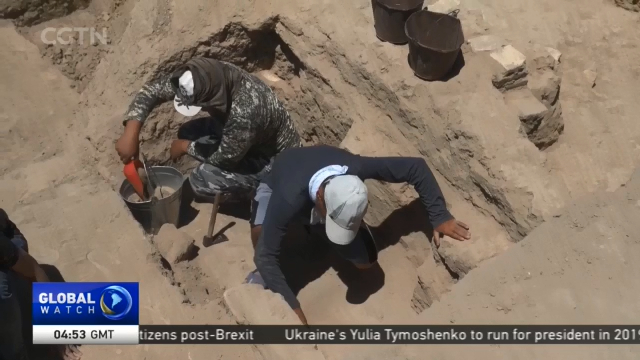
13:10, 21-Jun-2018
Searching for a Legend: Chinese, Uzbek archaeologists hunt for buried ancient civilization
03:08

Uzbek and Chinese archaeologists have teamed to search for clues in the hunt for a legendary capital of an ancient civilization buried in Central Asia. CGTN's Guy Henderson reports from Uzbekistan.
Nearly 2 and half thousand years of civilisation lie beneath this soil. Each day, Uzbek and Chinese archaeologists are discovering just a little more.
"There are some very surprising things here."
Down there they've found what was a pipe to pump drinking water, Lin Ling Mei tells us: a suggestion that a lot of people once lived here.
"The system goes outside city." Guy: "so it was quite sophisticated?" Mei: "yes."
After about 1 and a half thousand years: they left.
LIN LINGMEI CHINESE ARCHAEOLOGIST "It was continually used until 13th century AD. People think around the conquer of Ghengis Khan. It was abandoned. But actually besides this reason, maybe some other very important reason caused people to leave here."
More recently, getting in's been the issue for people like Mei.
LIN LINGMEI CHINESE ARCHAEOLOGIST "I had always wanted to come and do excavations here, but you know the situation in Central Asia was never that open you know."
Now it is, a museum is planned, with the Uzbek president's backing. The director of the Uzbek Archaeological Institute gives us a sneak preview. These dishes are more than 2,000 years old. These from when Islam first came here in the 10th century. Of special significance perhaps, shards of a highly advanced furnace that experts believe was used to make some of the most advanced weaponary of the time.
ADBULHAMID ADARBAEV, DIRECTOR UZBEK ARCHAEOLOGY INSTITUTE "It would withstand 1650-1700 °C. It is for this reason that they could make steel here. The steel used to be produced with great difficulty, by reaching high temperatures. For this reason all of this was kept secret."
Such technology no doubt left its mark on this mountainous region: for thousands of years, a meeting point for traders and warmongers. Underneath the layers remains an unanswered question: was this the long-lost capital of an ancient Asian Kingdom: called Dayuan? Stroke by delicate stroke: the team here hope to find out. GH, CGTN, in Uzbekistan's Fergana Valley.

SITEMAP
Copyright © 2018 CGTN. Beijing ICP prepared NO.16065310-3
Copyright © 2018 CGTN. Beijing ICP prepared NO.16065310-3